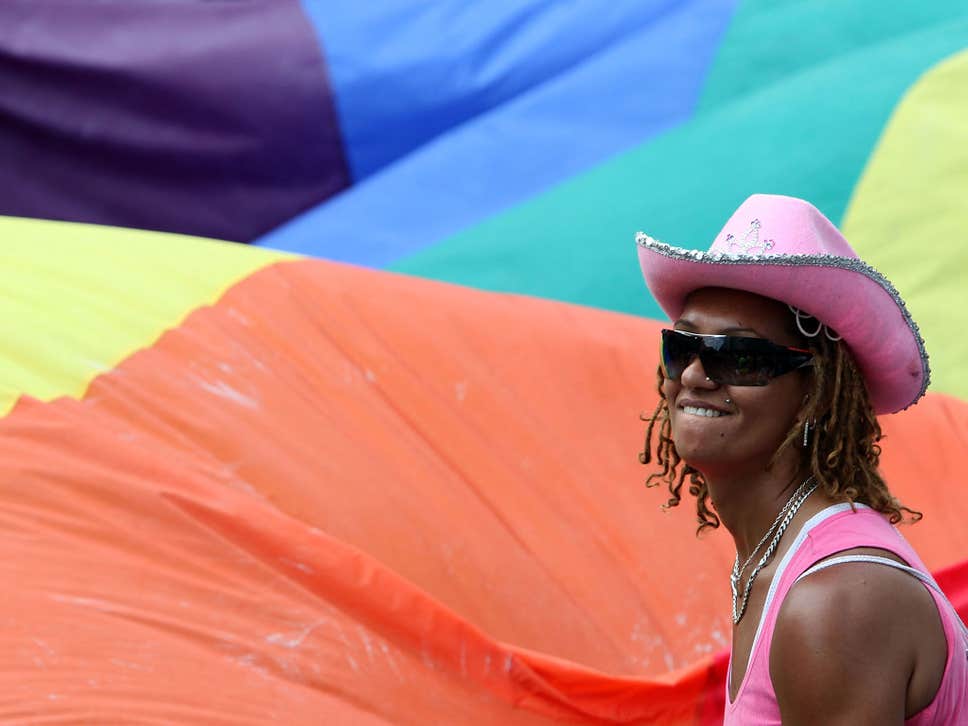As a bisexual disabled person of colour, Black Pride celebrates me in ways that mainstream LGBT+ events never have
Many of the scenes in London are shut off to me; I face inaccessible locations, see drag queens wear black face and have had my life mocked and erased while white patrons are given an easier time

I’ve been out as bisexual for the past 27 years. My first pride came in 1995. I experienced racism and dismissal from white LGBT+ attendees. I was disappointed, but the novelty of being visibly out and proud took the edge off. A little.
Fast forward a few years to the first and last time I attended Brighton Pride. The same racism was present; this time it came clad in army fatigues styled by white gay men who looked on with disdain as I marched alongside them. Later in the day as I entered Preston Park, one of these men spat on me. I cried all the way back to London.
With time, I’ve had to make a conscious decision whether or not to attend Pride events, as most of them are not welcoming to me. Nottingham Pride had young lesbians shoving each other into our bisexual information stall. They screamed at each other, “That’s you, that is!” They laughed at the volunteers, some of whom like me, had travelled miles to be there. These volunteers who had given their time and energy, knew full well that scorn was what awaited them. Too often Pride means no bisexual-specific content, compères making biphobic jokes, and having acts that use black or yellow face. I don’t want to go to that kind of place.
I joined the London Pride Community Advisory Board in 2015. At first, I was the bisexual officer, and then I moved to the black community officer. I left after UKIP’s LGBT+ group were allowed to march. At first, the Pride organisers refused UKIP’s request to march, but they relented on the day, allowing the group to march with people they hated and would happily see kicked out of the country, whether they were born here or not. My pleas to not let the group march were ignored; in fact the rest of the community advisory board seemed more angry with me than with UKIP. I have never returned to London Pride since that day.
As a black bisexual with disabilities, I am in a vulnerable and lonely situation in the world. Much of the LGBT+ scenes in London are shut off to me; I face inaccessible locations, seeing Drag Queens wearing black face, having my life mocked and erased, and regularly being stopped and searched by door staff at LGBT+ events, while white patrons people are not. Racism is part of my life, and it’s something that the majority of BAME LGBT+ people face too. However, the biphobia I experience from straight, lesbian and gay people of all ethnicities, is heartbreaking to me. It’s also the thing that makes me sometimes wish I was one way or the other; to be able to deny a big part of who I am.
I compiled the Bisexuals of Colour report in 2015; and found all of the respondents had experienced biphobia and racism in LGBT+ spaces. Most had been threatened with, or received violence including a high level of sexualised violence. The Bisexuality Report (2012, Open University) states that bisexuals experience higher levels of violence than both straight, gay and lesbian people in the UK. The report does not separate the statistics for different ethnicities, but when it comes to hate crimes, it’s often the most vulnerable among us who are at the most risk.
Today, I will be attending UK Black Pride. I will be volunteering on the Bi’s of Colour stall, with information, resources and a friendly face. I will be trying to reclaim Pride for those of us who have felt unwanted and unwelcome at other LGBT+ events. I will try to inspire hope.
The Pride March was started by a bisexual woman, Brenda Howard in 1970 in the US.
As a black bisexual person, I want other Black, Asian and Minority Ethnic bisexuals to be able to celebrate who they are without fear at UK Black Pride.
It may only be one day a year, but I’m not about to waste it: I am going to let others know that we exist, we are not just going through a phase on our way to becoming gay or straight, and that bisexuals of colour belong in the LGBT+ communities.

Join our commenting forum
Join thought-provoking conversations, follow other Independent readers and see their replies